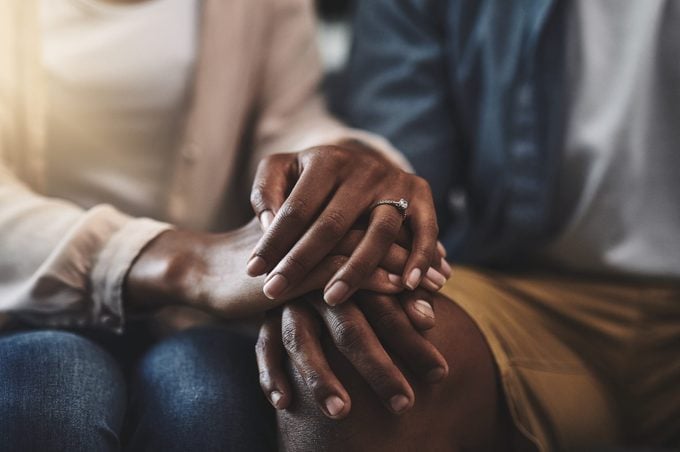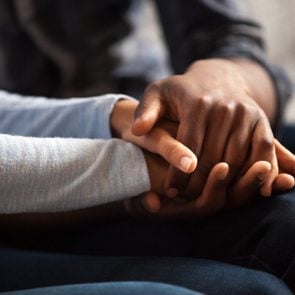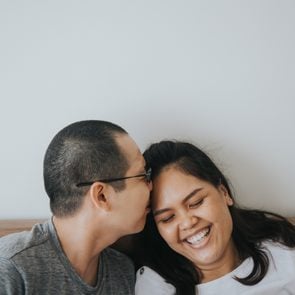Trust in a Relationship: Why It’s Important—and How to Build It
Updated: Jul. 21, 2023
Trust in a relationship is a critical part of a happy, healthy romantic partnership. Follow our expert tips on how to build it.
Our editors and experts handpick every product we feature. We may earn a commission from your purchases.
The importance of trust
Building trust between you and your partner is fundamental to a successful and healthy relationship. That’s because trust goes hand in hand with essential components of a relationship, such as honesty, open communication, vulnerability, and respect, making it of paramount importance.
“Trust is the foundation of any relationship,” says Reena B. Patel, San Diego-based licensed educational psychologist, board-certified behavior analyst, and author of Winnie & Her Worries. “Lack of trust can sabotage a relationship before it begins,” she says. Patel explains that respect shows your partner you value them, allowing you to feel secure and confident.
“Trust provides motivation and positive energy to help support a healthy relationship,” she says. (Here’s more successful relationship advice.)
Laurel House, dating and relationship coach and founder of Love Actually Academy, explains that trust occurs when someone’s thoughts align with their words and with actions. “You don’t sit and wonder if what they are saying is what they’re actually feeling, or what they’re saying is what they are actually doing. You trust that they are being honest and true,” she says.
Here, we spoke with relationship experts about trust in romantic relationships: what it means, why it’s important, and how to achieve it.
The meaning of trust in a relationship
The dictionary defines trust as a belief in the character, strength, or truth of someone or something, explains Bethany Cook, a Chicago-based clinical psychologist and author of What it’s Worth: A Perspective on How to Thrive and Survive Parenting.
“That being said, humans are fallible and will make mistakes which inevitably break the trust between two people,” Cook says. “The key to a strong relationship is how this tear in the relationship is repaired. An apology, changed behavior, and kind words are a good start to repairing any tear.” (Adopt this quick habit to improve your relationship.)
You believe what your partner says
For House, the meaning of trust is simple. “Trust means that you believe what your partner says,” she says.
“You don’t question that they are ill-intentioned or trying to hurt you or hide something from you,” she says. “And if you do get hurt by an action or words that they say, you don’t believe that it was intentional. You trust that it was an accident, it was thoughtless, or otherwise unintentionally causing harm.”
There’s honesty, openness, and transparency
Danielle Laura, relationship counselor and author of Dear Love, I’m Ready for You, says, “There are three main pillars that make up trust: honesty, openness, and transparency.”
“Honesty requires that you be true to yourself and your partner by putting everything on the table without hiding. Openness requires you to share the vulnerable things that feel hard to talk about, and hold the space for your partner to share as well. Transparency requires that you’re in tune emotionally with what’s being said, felt, heard, and understood,” she says. “This combination is what leads to ultimate trust.”
Laura says that this trio of traits helps ensure a trust-building process and leads to increased vulnerability, depth of connection, and long term fulfillment. (Here’s the difference between healthy vs. unhealthy relationships.)

Why is trust in a relationship important?
For a happy, healthy relationship built to go the distance, trust is crucial.
“Just as important as those three little words ‘I love you,’ being able to say ‘I trust you’ is critical for love that lasts,” says Jessica L. Griffin, associate professor of psychiatry and pediatrics at the University of Massachusetts Medical School in Worcester.
“Our partner should be our respite from the outside world, a soft spot for us to land. In order for trust to exist and grow, we need to know that our partner ‘gets us,’ has our best interests, and that we can depend on them to be available—e.g., be physically and emotionally present—for us,” Griffin says.
It’s a source of comfort and safety
House explains that romantic relationships should be a source of comfort and safety.
“A relationship is supposed to allow you to exhale. A relationship should make you feel supported and not alone. A relationship should give you the confidence and also the safety net to feel like you can do you and be more. A relationship should be your safe place where you can let your guard down and just be. When there is a lack of trust, all of that can be destroyed,” she says.
The safety that trust brings to a relationship is critical, agrees Laura.
“Trust in a relationship is of the utmost importance as it allows for both parties to feel safe to be fully accepted, and free expression leads to deeper connection and a greater understanding of one’s self and partner, further leading to growth and expansion,” Laura says. “As we grow and expand, we are also deepening our sense of happiness and fulfillment as well.” (Is your relationship unhealthy? Here are the signs of a toxic relationship.)
Trust issues in relationships
In her practice as a dating and relationship coach, House has worked with many clients battling trust issues.
You’re too distrusting
“I have seen couples who get scared every time the other goes out with friends. I have heard my clients tell me that their partner makes them take photos of the person who they are out with, answering the phone no matter what, and texting every 30 minutes when they are out in order to prove that they are telling the truth,” House says.
House explains that some people shrug off bad intentions, claiming that the partner wants to see that they’re having fun when in actuality it’s about control. “In reality, they want confirmation that you were with who you said you are with. This can create major issues and distrust on both sides,” she says.
You’re overly trusting
However, on the flip side, some of House’s clients are overly trusting.
“Even with obvious displays that should break the trust, they give their partner the benefit of the doubt. They have blinders on because they don’t want to believe that people are bad,” she says.
House says that good people often assume positive intentions from others, even when the signs are not there. House says that “Those people often end up feeling blindsided once the reality hits them that the person who they have blindly trusted didn’t deserve it. (These are the worst relationship lies you can tell.)
You’re afraid to trust
For Laura, trust issues usually have deep personal roots.
“In my experience, I see the root of trust issues within relationships stem from a lack of trust in one person’s ability to be fully truthful with themselves,” explains Laura. “Often, there are layers of guilt, shame, and fear that one partner is afraid the other will find out about and ultimately choose to end their relationship,” she says.
Laura believes that fear of loneliness and rejection drives a lack of honesty for some people. “At the core of it all, people deeply crave connection, and the thought of being alone often outweighs the radical vulnerability of being honest, so things get suppressed or hidden, furthering the cycle of trust issues,” she explains.
(Try these habits that make you trustworthy.)
How can you build trust in a relationship?
Laura believes trust in a relationship starts with being honest, open, and transparent.
Practice reflective listening
She advises people to share one vulnerable thing with your partner each day to get used to honest expression.
“Practice the art of reflective listening as they share, repeating back to them what you’ve heard so they feel seen and understood,” Laura says. “Over time, the more you practice this level of honesty, the greater trust you’re building, as well,” she says. (Here’s how to boost your listening skills.)
Do things that require partnership and collaboration
Rachel Eva Dew, board-certified doctor of natural medicine, integrative life transformation coach, and co-founder of the integrative telemedicine platform Modi Health, says that trust is a two-way street. “Trust flows inside-out and outside-in. This means that an individual must both be trustworthy in their outward behavior and also work on their inner trust issues and patterns,” Dew says.
She adds that people who believe others can’t be trusted will unconsciously seek out relationships that will validate that belief. “Building trust takes time and also seeing the person exhibiting consistent reliable behavior. Doing things that require partnership and collaboration can breed trust,” Dew says.
Respect your partner
Equally, important is making sure you respect your partner. “Mutual respect is a must for any healthy relationship,” says Cook.
When you respect somebody, regardless of whether you disagree, you are still valuing them, says Cook. She adds “When we respect someone else, we see them as a whole person and are less likely to use gaslighting and manipulation tactics to get one’s needs met. We can’t trust someone we don’t respect.” (Beware of the signs you’re dating a narcissist.)

Does it take time to build trust in relationships?
House believes that you can start to build the foundation for trust even before the first date.
“Show up as someone who is communicative, honest, trustworthy, and trusting. This way you are setting the expectation from the very beginning, creating an environment of trust within your relationship. When they see that that is who you are and how you are, they should hopefully speak and act in kind,” House says.
Building trust doesn’t necessarily have to take a lot of time, says House. “You can go into a relationship trusting someone, ready to believe what they say, and expecting that their intentions are pure,” House says, explaining that watching for consistency is important, as is calmly communicating if any questions about their words, actions, or past arise.
“Don’t interrogate them with an expectation that you’re going to find out the truth. Instead, simply ask questions with an open mind and heart,” she says.
“By setting the tone of trust from the very beginning, you can create a trusting relationship that allows you to become closer faster, experiencing true authentic deeper feelings more rapidly, and truly getting to know each other from the beginning,” House explains.
For Patel, however, slow and steady wins the race. She says trust is not something that happens overnight. “Trust develops over time, requires a level of reliability in knowing you will always be there, and understanding. Trust also requires sacrifice,” says Patel.
Can you rebuild trust in relationships?
After you’ve lost your romantic partner’s trust, it’s only natural for there to be negative feelings, hurt, or insecurity. After all, trust helps create safety—and when that trust is ripped away, so is the safe feeling. However, little by little, with effort and communication, trust is possible to rebuild. (Here are some tips for having healthy and honest communication in relationships.)
Try a sincere apology
For Cook, as long as there is a sincere apology, it may be possible to regain trust. “Start out with a heartfelt apology that includes changed behavior and allow this person to have as much space and time they need,” she says, also recommending following their cues and respecting their boundaries, as well as keeping your promises. But she cautions against being forced to perform guilt.
“Don’t get sucked into a situation where you must ‘show’ someone how sorry you are for the rest of your life because that isn’t healthy either,” Cook says. (Here’s how to tell if you’re in a codependent relationship.)
Take the time and make the effort
“Trust, once broken, can be rebuilt,” says House. “But it takes true time and dedication from both parties. It is a multi-step process of rebuilding that can feel time-intensive and frustrating for both sides. But if that trust is truly rebuilt, often times the relationship is actually stronger in the end.”
Next, try these small ways to make your partner feel loved.




